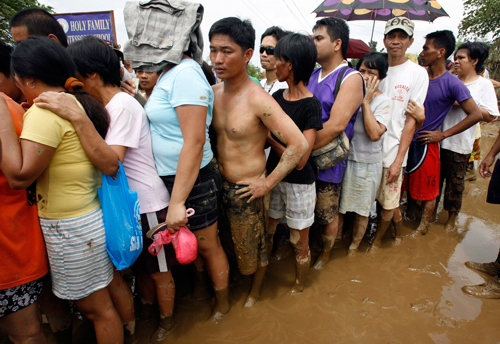MSF doctors and logisticians are currently assessing the situation on the main island of Luzon, as Typhoon Parma continues to rain on the northern Philippines. Authorities fear new landslides and floods as heavy rains and strong winds still prevail in the area. The two MSF teams conducting the assessment are also carrying out medical consultations as they move from place to place.

Philippines 2009 © Reuters
Residents wait for relief supplies in a muddy street in Rizal, west of Manila.
Doctors Without Borders/Médecins Sans Frontières (MSF) teams are currently assessing the situation on the main island of Luzon, as Typhoon Parma continues to rain on the northern Philippines. Authorities fear new landslides and floods as heavy rains and strong winds still prevail in the area. The two MSF teams conducting the assessment are also carrying out medical consultations as they move from place to place. One team is heading east of the town of Claveria, and the other south to Ilocos.
Almost two weeks after Tropical Storm Ketsana hit the Philippines, large parts of the city of Manila and surrounding areas are still underwater. Despite the quick and efficient response of the authorities, some remote areas are still without support. MSF teams have been focussing on the harder to reach areas, such as Laguna Bay to the southeast of the city, and have been providing mobile clinics for people who have been unable to access government health structures. In total, eight MSF staff members, sometimes travelling to areas by boat, have provided more than 800 medical consultations.
“The main pathologies are diarrhea, fungal infections of the feet and legs, and respiratory tract infections,” said Oifa Bouriachi, MSF’s emergency coordinator. “The stagnant water and disruption of the sanitation system could cause health problems and we need to continue monitoring it closely.”
Although the situation has stabilized near Manila and water levels are slowly dropping, nearly 340,000 people are still sheltering in more than 500 evacuation centers. Flooding in some areas could take months to subside. So far, MSF teams have provided more than 3,000 hygiene kits as well as equipment to improve sanitary conditions in the evacuation centers.
In addition, MSF has sent 22 tons of material to Manila including non-food items such as blankets, jerry cans, and hygiene kits. MSF teams plan to remain in the area to closely monitor the situation and respond to any developing needs.



